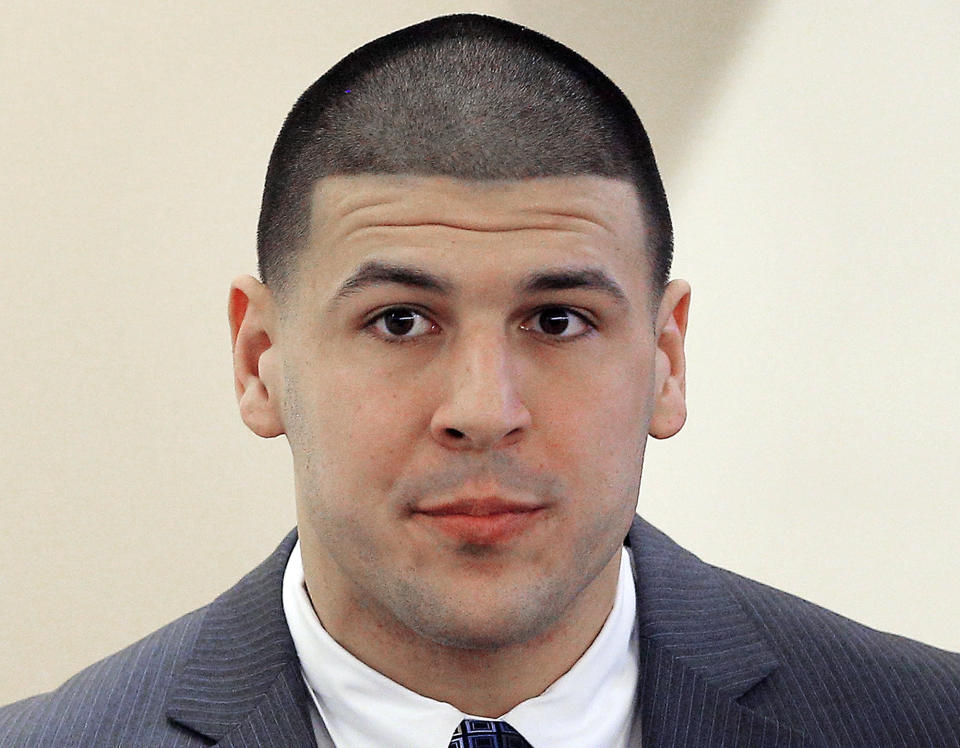Aaron Hernandez found to have severe CTE; family is suing NFL, Patriots
Researchers at Boston University determined that former New England Patriots tight end Aaron Hernandez had stage 3 chronic traumatic encephalopathy, or CTE, and according to Hernandez’s lawyer, it was the most advanced case they had seen in a player as young as Hernandez.
Hernandez, who was in a Massachusetts prison serving a life sentence for committing murder but was acquitted of committing two others, killed himself in his cell in April. He was 27.

Hernandez’s brain was examined by Dr. Ann McKee, who is director of the CTE Center at Boston University and also chief of neuropathology at the VA Boston Healthcare System, as well as a second neuropathologist from VA Boston. McKee has developed categories to describe the severity of CTE, which can be found only posthumously: stage 3, which she found in Hernandez, involves cognitive impairment and trouble with executive functions, like planning and organizing. Additionally, they found early brain atrophy and large perforations of the septum pellucidum, a central membrane of the brain.
According to a statement from McKee’s team at the CTE Center and Boston University, the photo below shows “the classic features of CTE in the brain of Mr. Hernandez. There is severe deposition of tau protein in the frontal lobes of the brain (top row). The bottom row shows microscopic deposition of tau protein in nerve cells around small blood vessels, a unique feature of CTE.”

McKee’s team thanked Hernandez’s family for donating his brain.
Attorney Jose Baez announced the findings at a Thursday news conference, where he also announced that he would be suing the NFL and Patriots in federal court on behalf of Hernandez’s 4-year-old daughter Avielle.
According to the Associated Press, the lawsuit claims that the Patriots and the NFL deprived Avielle Hernandez of her father’s companionship. It is unclear whether Hernandez’s family can receive money from the $1 billion settlement the NFL has agreed to pay former players and their families who suffered brain damage while playing football.
There was no mention of how much money Baez is seeking from the two organizations, nor why other groups, like the University of Florida, where Hernandez played for three years, or Bristol Central High School in Connecticut, where he played as a prep standout.
A fourth-round draft pick in 2010, Hernandez was a dynamic offensive weapon for the Patriots when he was healthy, but trouble had long followed him, and it seemed to intensify over the final few years of his life. Hernandez never seemed to recover from his father’s death when he was 16. In 2015, he was convicted of killing a friend, Odin Lloyd, two years earlier; just a few days before killing himself, he was acquitted in the deaths of two other men, Safiro Furtado and Daniel de Abreu, whom he was accused of killing near a Boston nightclub where all three had been earlier on the evening of Furtado and Abreu’s death.
More from Yahoo Sports:
• Jeff Passan: There’s no excuse for MLB’s negligence on netting
• Former NFL star Ricky Williams arrested in Texas
• Players ask Goodell to back racial equality campaign
• Ex-MLB star gets prison in $200M corruption scandal



